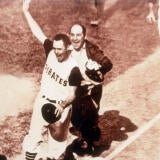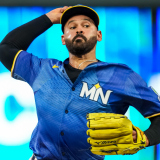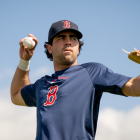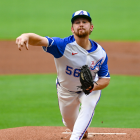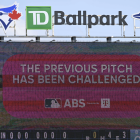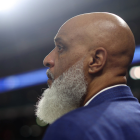Milwaukee Brewers 2019 season preview: Can Christian Yelich and company repeat in the NL Central?
The Brewers will try to hold off the Cubs and Cardinals in a beefed-up division
It took 163 games for the 2018 Brewers to fend off the Cubs in the National League Central, but they did just that. Milwaukee claimed its first division title since 2011 and pushed the Dodgers to a Game 7 of the NLCS. GM David Stearns followed up that success by making a splash addition in the person of veteran catcher Yasmani Grandal. That plus the strong returning core means the Brewers are a threat to repeat as division champs. Of course, the Cubs are still strong, the Cardinals added Paul Goldschmidt, and even the Reds profile as much improved. Can the Brewers overcome all that? Let's have a detailed look at the 2019 Crew ...
- 2018 record: 96-67 (+95 run differential)
- 2019 depth chart: Click here
- 2019 schedule: Click here
Probable lineup
- Lorenzo Cain, CF
- Christian Yelich, RF
- Jesus Aguilar, 1B
- Travis Shaw, 3B
- Ryan Braun, LF
- Mike Moustakas, 2B
- Yasmani Grandal, C
- Orlando Arcia, SS
Bench: Ben Gamel, OF; Hernan Perez, INF/OF; Manny Pina, C; Eric Thames, 1B/OF
Perez, who bats right-handed, will likely see some platoon action at third base, and he may also spell the lefty-swinging Moustakas at second base on occasion.
Probable rotation
- Jhoulys Chacin, RHP
- Chase Anderson, RHP
- Jimmy Nelson, RHP
- Zach Davies, RHP
- Brandon Woodruff, RHP
Freddy Peralta, Corbin Burnes, Aaron Wilkerson, and Josh Tomlin could all be in the mix for the fifth spot if Woodruff struggles or gets hurt.
Probable bullpen
Closer: Jeremy Jeffress, RHP
Setup: Josh Hader, LHP; Corey Knebel, RHP
Middle: Matt Albers, RHP; Jacob Barnes, RHP; Alex Claudio, LHP; Taylor Williams, RHP
Long: Junior Guerra, RHP
Can Yelich keep the power going?
Yelich last season powered his way to the NL MVP award. "Powered" would of course be the operative word. Specifically, he homered 36 times and slugged .598. His previous highs in those respective categories were 21 and .483. To be sure, going from Marlins Park to Miller Park helped, but he also saw notable power gains on the road last season. The question -- a question that will be central to the Brewers' fortunes in 2019 -- is whether Yelich can sustain that power growth.
On the one hand, Yelich's percentage of hard-hit balls spiked last season to a lofty 47.6. That bodes well going forward. What bodes less well is that Yelich's percentage of home runs on fly balls vaulted to 35.0. That's versus a career mark of 20.3 (a figure that includes last year's big number). The big concern for Yelich and the Brewers is that big spikes in HR/fly ball rates tend to be unsustainable, particularly when that figure is as high Yelich's was last season. To be sure, Yelich is still a highly productive player even when he's not mashing 36 home runs in a season, but MVP-grade Yelich needs to defy the odds and prove he's become a true power hitter at the plate. On that front, the 2019 season will be highly telling.
How much does Braun have left?
Braun, as you see above, is penciled in as the Brewers' No. 5 hitter and starting left fielder. He's also going into his age-35 season. As you know, hitters in their mid-thirties are often subject to steep declines. In Braun's case, he's seen OPS+ decline from 135 in 2016 to 111 in 2016 to 106 last season. Braun in 2018 also batted just .258/.302/.444 against right-handed pitching with 15 unintentional walks against 61 strikeouts. Throw in his sub-par outfield defense, and it's worth asking whether Braun should be an everyday player at this point.
One possible solution is to platoon Braun in left with Eric Thames, who boasts patience and power from the left side. Such an arrangement would be passable at best defensively, but it would likely be quite productive at the plate. The issue of course is whether Braun, a 12-year vet and Brewers lifer who's owed $19 million for the upcoming season, would be accept being the light half of a platoon. Likely, Braun would have to play his way out of regular duty, and only in the event of sustained struggles would manager Craig Counsell introduce a job-share. Decline, of course, isn't linear, and that's especially the case with once-great hitters like Braun. It's possible he'll have a stronger season in 2019 than he did in 2018. If he shows signs of continued skills loss, though, then Counsell may need to have the tough conversation.
Nelson's back
The righty Nelson had a breakout season in 2017 in terms of both run prevention and at the command-and-control level. That was thanks in large measure to some mechanical changes, which of course bodes well for the future. That September, though, he suffered a shoulder injury on the bases, and it wound up costing him all of the 2018 season. Now, though, he's finally back.
That's a long layoff, certainly, but the consoling knowledge is that it's not a pitching-related injury. Nelson also benefited from strengthened legs during his breakout 2017, and theoretically at least a shoulder injury shouldn't greatly compromise the way he trains his lower half. So long as he's fully recovered and able to get back to his customary strength levels, the expectation is that Nelson at age 29 will get back to being the pitcher he was in 2017. That should help the Brewers make up for the free agent loss of Wade Miley and then some. Nelson as a fixture also cascades down the rotation and alleviates some of those depth concerns that have been constant for Milwaukee in recent years. As 2019 comeback candidates go, Nelson figures to be an important one.
An Arcia breakout?
Arcia is already a tolerable big-league shortstop thanks to his plus glovework, but can he be more than that? Probably. The biggest thing in his favor is that Arcia is a former consensus top-10 overall prospect who put up solid offensive numbers in the minors despite being much younger than the competition at every stop.
Last season, Arcia's struggles led to his being optioned, but he put up better numbers upon his return. He also went off in the postseason -- .333/.353/.606 in 34 plate appearances. Yes, the sample size was miniscule, but it did show he can do big damage on contact against playoff-caliber pitching. At age 24, perhaps Arcia is ready to take the next step with the bat?
The Moustakas experiment
Yes, the Brewers are planning to go with Moustakas at second base. He's 30 years of age, and has never played second as a professional. He's a career third baseman with a few reps at first in recent years. Moustakas does have a little middle infield experience, but that was more than a decade ago in the low minors. Suffice it to say, moving a player to a more demanding position at an age that typically lends itself to less defensive responsibility is a bold choice for Milwaukee. The thinking, probably, is that the profluence of infield shifting in tandem with the fact that balls are put in play less than ever these days make it a doable proposition. How Moustakas fares -- and in related matter how soon top prospect Keston Hiura is ready to take over at the position (he'll likely open 2019 at Double-A) -- will be a notable subplot this season.
Grandal is for real
The veteran catcher had a rough postseason, and indeed blocking pitches is not one of his strengths. Grandal is, however, an elite pitch-framer and also one of the best-hitting catchers in the game today. For his career, he owns an OPS+ of 115, and over that span he's averaged 25 home runs and 76 unintentional walks per 162 games played. He should particularly enjoy going from Dodger Stadium to Miller Park from a power standpoint. Kudos to the Brewers for quietly adding one of the best catchers in the game today.
The NL Central will be a challenge
As noted up top, the NL Central figures to be rough circuit in 2019. That was certainly case last season, as the division yielded four winning teams. The Cubs have had a quiet offseason, but they still project for 90-plus wins in 2019. The Cardinals have added Goldschmidt and Andrew Miller, and they'll have a full season under manager Mike Shildt. The Pirates, coming off a winning season in 2018, have sleeper potential, and the Reds have been among the most active teams this offseason.
As for the SportsLine Projection Model (@SportsLine on Twitter), it sees the Brewers as an 88-win team at the moment, just a bit behind the Cubs. Right now, the system gives Milwaukee a 23.6 percent chance of repeating as division champs but a healthier 53.1 percent chance of making the postseason. In some ways, that reflects the reality that the Brewers last season outplayed their run differential by five full games. Often, teams that do that come back to earth in year two.
Whatever the case, the Brewers figure to be in the thick of the tough NL Central race, along with the Cubs and Cardinals. Sounds a lot like 2018, no?


